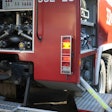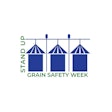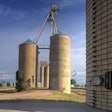
Dr. Carol Jones, professor and Buchanan Chair at Oklahoma State University, and Jeff Decker, president, Decker Consulting & Investigations, presented the Opening Workshop at GEAPS Exchange 2019 on March 10 in New Orleans.
The session focused on answering the session's name "Why Are They Still Entering Grain Bins?" The speakers contend the first line of defense against bin entry is maintaining good quality stored grain to prevent it from damage and crusting inside the bin.
Jones said every year, roughly 30 deaths and 60 non-death entrapments occur due to people entering bins to restore movement to abridged grain.
Decker followed up with the chilling fact that "We have figures on children dying as young as two and people as old as their 80s. It effects everyone."
Start by cleaning grain before even loading it into a bin. Jones said 50% of the cases she's called on involve annual bin cleanings. "But if it's in good condition going in, there's less to clean up at the end of the year," Jones said.
Other best practices include aeration, monitoring with temperature cables, using air quality monitors inside the bin, recordkeeping and marketing poor quality grain first.
Decker provided an update on the latest rescue equipment and products available to the industry, including grain cofferdams, grain shoes made to aid first responders with walking on the grain mass, harnesses, lock-out tag-out materials and sump fingers.
Even with the tools available to rescue grain-entrapped victims, Decker said, ultimately, "I'd just as soon never sell rescue equipment again if we can simply prevent these accidents from happening."
He noted that in addition to maintaining good grain quality, rodding ports can be added to tunnels underneath bins so workers can agitate the grain inside from a secure location.
Employee training and working with your community's fire department and first responders were noted as key to preventing death from grain bin entrapment.
"Conduct hands-on training every six months and make sure everyone in your facility knows how to use a grain rescue tube," Jones said. "And if that rescue tube isn't at arm's reach, it'll do you no good."
Elevator managers were encouraged to contact their local fire chiefs to familiarize them with their grain facilities, pointing out important areas, like where chemicals are stored and where the equipment and electrical shut-offs are located.

















